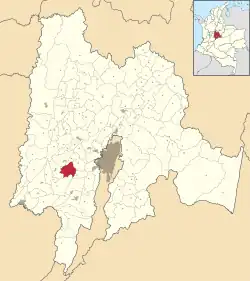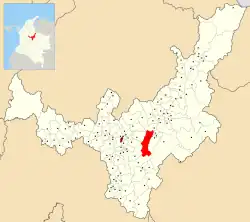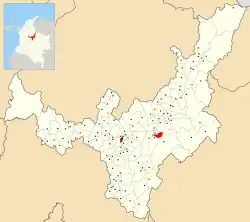Juan de Sanct Martín
Juan de Sanct Martín, also known as Juan de San Martín, was a Spanish conquistador. Little is known about De Sanct Martín, apart from a passage in El Carnero (1638) by Juan Rodríguez Freyle and Epítome de la conquista del Nuevo Reino de Granada, a work of uncertain authorship.[2][3] He took part in the expedition from Santa Marta into the Eastern Ranges of the Colombian Andes led by Gonzalo Jiménez de Quesada and founded Cuítiva, Boyacá in 1550.[1] Juan de Sanct Martín headed the left flank of the Spanish troops in the Battle of Tocarema against the Panche on August 20, 1538, while his fellow conquistador Juan de Céspedes commanded the right flank. In this battle, Juan de Sanct Martín killed the cacique of the Panche and was hurt himself.[2] Juan de Sanct Martín had confronted the Panche the year before, when he was sent to the west while De Céspedes went south. Due to the resistance of the bellicose Panche, De Sanct Martín returned to the Spanish camp.[4]
Juan de Sanct Martín | |
|---|---|
| Nationality | Castilian |
| Other names | Juan de San Martín |
| Occupations | Conquistador |
| Years active | 1536->1550 |
| Employer | Spanish Crown |
| Known for | Spanish conquest of the Muisca Founder of Cuítiva Founder of Pesca Quest for El Dorado |
| Notes | |
Conquest by Juan de Sanct Martín
| Name bold is founded |
Department | Date | Year | Notes | Map |
|---|---|---|---|---|---|
| El Colegio | Cundinamarca | 1537 | [5] |  | |
| Pesca | Boyacá | 20 December | 1548 | [6] |  |
| Cuítiva | Boyacá | 19 January | 1550 | [7] |  |
See also
References
- (in Spanish) List of conquistadors led by Gonzalo Jiménez de Quesada Archived 2016-03-09 at the Wayback Machine - Banco de la República
- Rodríguez Freyle, 1638, p.117
- Epítome, p.82
- Blanco Barros, s.a., p.3
- (in Spanish) Official website El Colegio Archived 2014-03-10 at archive.today
- (in Spanish) Pesca
- (in Spanish) Official website Cuítiva Archived 2015-06-03 at archive.today
Bibliography
- Blanco Barros, José Agustín. s.a. Historia de Bogotá, 1–18. Sociedad Geográfica de Colombia. Accessed 2017-03-06.
- Rodríguez Freyle, Juan, and Darío Achury Valenzuela. 1979 (1859) (1638). El Carnero - Conquista i descubrimiento del nuevo reino de Granada de las Indias Occidentales del mar oceano, i fundacion de la ciudad de Santa Fe de Bogota, 1–598. Fundacion Biblioteca Ayacuch. Accessed 2017-03-06.
- N, N. 1979 (1889) (1539). Epítome de la conquista del Nuevo Reino de Granada, 81–97. Banco de la República. Accessed 2017-03-06.
Further reading
- Acosta, Joaquín. 1848. Compendio histórico del descubrimiento y colonización de la Nueva Granada en el siglo décimo sexto - Historical overview of discovery and colonization of New Granada in the sixteenth century, 1–460. Beau Press. Accessed 2017-03-01.
- De Castellanos, Juan. 1857 (1589). Elegías de varones ilustres de Indias, 1–567. Accessed 2017-03-01.
- Fernández de Piedrahita, Lucas. 1676. VI. Historia general de las conquistas del Nuevo Reino de Granada. Accessed 2017-03-01.
- Jiménez de Quesada, Gonzalo. 1576. Memoria de los descubridores, que entraron conmigo a descubrir y conquistar el Reino de Granada. Accessed 2017-03-01.
- Ocampo López, Javier. 1996. Leyendas populares colombianas - Popular Colombian legends, 1–384. Plaza y Janes Editores. Accessed 2017-03-01.
- De Plaza, José Antonio. 1810. Memorias para la historia de la Nueva Granada desde su descubrimiento el 20 de julio de 1810, 1–464. Imprenta del Neo-Granadino. Accessed 2017-03-01.
- Simón, Pedro. 1892 (1626). Noticias historiales de las conquistas de Tierra Firme en las Indias occidentales (1882-92) vol.1-5. Accessed 2017-03-01.
